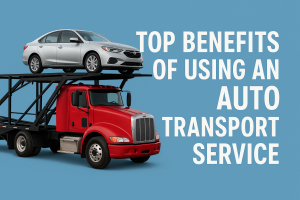Do you need to move your van but don’t want to drive? There’s a better way to move that van. Using a van shipping service is an excellent alternative.
We understand that van shipping can seem like uncharted territory. To help streamline the process, we have created a great resource you can use to make informed decisions when you need to ship a van.
Take a minute to explore the essentials of shipping a van. In this guide, we cover everything you need to know to choose the best shipping partner for your van’s journey.
Table of Contents
Van Shipping Methods
As part of your decision-making process, it’s a good idea to explore your van shipping options. You might be surprised at how many different ways you can ship a van.
Open-Air Transport
The most common van shipping method is the open-air carrier. It consists of a trailer and platform, but doesn’t have sides or a roof. These carriers can transport multiple vehicles, which makes them a more cost-effective option.
One thing to keep in mind is that open-air carriers leave your van exposed to the elements.
Enclosed Transport
If maximum protection is a priority, enclosed transport might be the ideal choice for shipping your van. An enclosed trailer or container offers added safety and security during transit.
Although enclosed transport generally comes at a higher cost compared to open-air transport, the extra protection is worth the investment.
Flatbed Service
In certain situations, such as transporting oversized or non-running vans, flatbed service becomes a valuable option. Flatbed trailers offer versatility and can accommodate vans of various sizes and conditions. Flatbed service works well for cargo van shipping.
Take the time to weigh out the benefits and costs of each van shipping option before making your final decision. A representative at the auto transport company you’re interested in using can always clarify any questions you might have.
Shipping a Van vs Shipping a Car
Vans differ from cars in several ways when it comes to shipping. These differences stem from their size, weight, dimensions, and specific features. Here are some key factors that make vans different to ship than cars:
Size and Dimensions
Vans are generally larger and taller than standard cars. They may require specialized equipment, such as flatbed trailers or carriers with higher weight capacity and sufficient clearance, to accommodate their size and dimensions during transportation.
Weight and Payload Capacity
Vans tend to have a higher weight and payload capacity compared to cars. This can impact shipping costs, as carriers may charge based on weight or require additional considerations for heavier vans.
Interior Space and Configurations
Vans often have unique interior configurations, such as seating arrangements, cargo compartments, or customized features. If your van has specialized interior modifications, it’s crucial to communicate these details to the shipping company for appropriate handling and protection.
Accessibility and Loading
Vans may have different access points, such as sliding doors or rear doors, which require careful consideration during the loading and unloading process. The carrier you choose should be able to ensure they can safely and efficiently load the van without causing any damage to the vehicle or its surroundings.
Customization and Modifications
Vans are often customized for various purposes, such as camper vans, mobile offices, or specialty vehicles. These modifications may include added features, equipment, or unique structural elements. Make sure the company you go with knows how to ship a van with custom features.
Understanding these differences allows shipping companies to provide tailored services and solutions for vans, taking into account their specific requirements.
What Impacts Van Shipping Prices?
Another thing to consider when transporting a van is shipping costs. Understanding what influences these costs can help you crack the cost code and plan and budget effectively.
Here are the key factors that impact van shipping prices:
Distance
Miles matter. The distance between the pickup and delivery locations is one of the primary factors that affect shipping costs. Generally, the longer the distance, the higher the transportation expenses.
Size and Weight
The size and weight of your van are essential considerations when calculating shipping costs. Larger and heavier vans may require specialized equipment or carriers, which can impact pricing.
Seasonality and Demand
Timing is key. Seasonal fluctuations and market demand can influence shipping costs. During peak seasons or when there’s high demand for van transportation, prices tend to rise.
Additional Services
In addition to the basic transportation service, most transport companies offer various optional services. These services can enhance the convenience, efficiency, and safety of shipping your van but may come at an additional cost.
We’ll look more closely at additional services in a minute. For now, let’s see how you can cut shipping costs.
How to Save Money on Shipping
When shipping a van, there are several strategies you can employ to save costs while ensuring a reliable and secure transportation experience.
Here are some tips to help you save money on van shipping:
- Early bird booking
- Compare multiple quotes
- Be flexible with pickup and delivery
- Choose open-air transport
- Use terminal-to-terminal options
- Consolidate shipments
- Discounts and promotions
Another way to manage costs is to remove non-essential Items: Additional weight can increase shipping costs, so ensuring that your van only carries the necessary items can help keep expenses down.
Additional Van Shipping Services That Make Things Easier
Usually, standard shipping services suffice, but taking advantage of additional services can make the process even easier. The following services are something to consider adding:
Expedited Shipping
You’re on a tight deadline and need your van delivered quickly. In this case, an auto transport company that offers expedited shipping services is your best friend. These services prioritize your shipment and ensure faster transit times.
Keep in mind that expedited shipping typically costs more due to the need for special arrangements and dedicated resources.
Tracking and Notifications
Many shipping companies provide tracking services. You can monitor the progress of your van throughout the transportation process. As part of this service, you’ll receive real-time updates and notifications regarding pickup, transit, and delivery. T
This added visibility provides peace of mind and helps you plan accordingly.
Insurance Coverage
Most auto transport companies provide basic insurance coverage. They also carry business insurance. Both help protect the business and you, the customer.
Your van is a valuable asset, and having comprehensive insurance coverage can provide financial security and protection against unforeseen circumstances during transit.
When considering additional services, weigh the benefits against the associated costs to determine which ones align with your priorities and budget. It’s advisable to discuss these options with your shipping company and get a detailed quote that outlines the specific services included.
Essential Considerations for Van Shipping
When you need to ship a van, a professional transport company will take care of the details. That doesn’t mean you shouldn’t spend some time preparing your van for shipment. Insurance coverage and van prep are two essential details you should consider.
Insurance Coverage
We can’t emphasize enough the importance of protecting your valuable asset. On one level, you’ll rely on the transport company to get your van to its destination safely and without damage. The transport company’s insurance will certainly come into play, but you still need to understand their coverage.
Verify the insurance provided by the shipping company and understand the extent of protection offered by their policy. If needed, consider purchasing additional insurance to cover any gaps and protect your van against potential damage or loss.
Van Preparation
Ask your transport company if they can provide a checklist to help you prepare your van for shipping. If not, create your own and include the following:
- Clean the interior and exterior
- Remove personal belongings
- Secure loose parts
- Disable alarms
- Maintain appropriate fuel levels
Taking these precautions will minimize potential risks and help streamline the shipping process.
Research Shipping Companies
Choosing trustworthy partners to help ship a van means the world as far as making the process go smoothly. Where do you start?
Take time to research and compare different van shipping companies. A reputable and reliable shipping company is essential for a successful transportation experience.
Factor in things such as:
- Experience
- Licensing
- Insurance coverage
- Pricing
- Customer reviews
Earlier we mentioned a few of the differences between shipping a van vs. shipping a car. An auto transport company that doesn’t have much experience shipping vans may not be your ideal choice for a shipping partner. Be specific when you ask about the shipper’s level of experience.
A key part of your research process is getting estimates or quotes in writing. Finally, base your decision not only on price, but also evaluate the transport company’s track record and their ability to meet your specific needs.
We Can Ship Your Van Just About Anywhere
Shipping a van doesn’t need to be a complex project. Armed with knowledge and understanding of van shipping methods and cost considerations, you can navigate the process with confidence.
Use your research and choose a reputable shipping company that aligns with your requirements. With these insights and practical tips, your van will reach its destination safely and efficiently.
Mercury Auto Transport offers over 15 years of shipping experience. Whether you need to ship a van or another type of vehicle, we guarantee a smooth trip.
We’d love to provide you with a free quote.






